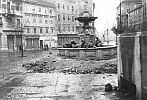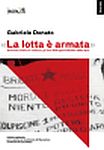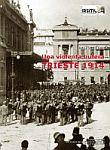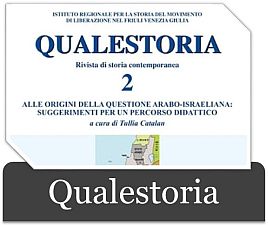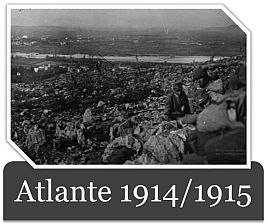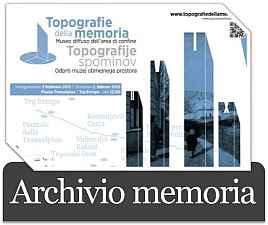 Protagonisti a cura di Anna Di Gianantonio
Protagonisti a cura di Anna Di Gianantonio
| Qualestoria anno XXXIX n.2 dicembre 2011 | ||||||
| Protagonisti | ||||||
| a cura di Anna Di Gianantonio | ||||||
| 150° Anniversario dell'Unità d'Italia 150th Anniversary of Italian Unity | ||||||
| Giovanni Miccoli | Il processo di secolarizzazione: Chiesa, Stato, società nel Risorgimento The secularization process: Church, State, society during the Italian Risorgimento | 5 | ||||
| Protagonisti - Protagonists | ||||||
| Anna Di Gianantonio | Nota introduttiva Introduction | 21 | ||||
| Studi e Ricerche - Studies and researches | ||||||
| Francesco Toncich | La ricezione del «caso Oberdank» e del primo irredentismo nella stampa viennese (agosto 1882 - gennaio 1883) The reception of the «Oberdank affair» and the first Irredentismo in the Viennese press (August 1882 - January 1883) | 25 | ||||
| Fabio Todero | Ercole Miani e l'impresa fiumana Ercole Miani and the Fiume enterprise | 43 | ||||
| Ernesto Preziosi | Mons. Lorenzo Bellomi. Assistente ecclesiastico dell'Università cattolica del Sacro Cuore Mons. Lorenzo Bellomi. Ecclesiastic assistant at the Catholic University of the Sacred Heart | 59 | ||||
| Documenti e problemi - Documents and problems | ||||||
| Marina Rossi | Lajos Domokos e Giuseppina Martinuzzi, pionieri del socialismo adriatico Lajos Domokos and Giuseppina Martinuzzi, pioneers of the Adriatic socialism | 91 | ||||
Roberto Spazzali | «Agli amici triestini». Brevi note di corrsipondenza tra Leo Valiani, Giuliano Gaeta e Umberto Felluga (luglio 1944 - febbraio 1945) | 103 | ||||
| Note critiche | ||||||
| Giovanni Miccoli | L'opera di Enzo Collotti tra impegno civile e ricerca storica | 117 | ||||
| Franco Cecotti, Paolo Albanese | La collezione fotografica di Fabio Albanese. Archivi di famiglia tra memoria e storia | 123 | ||||
| Fabio Todero | Silvio Benco, «nocchiero spirituale» di Trieste, miscellanea di studi, a c. di F. Senardi, Istituto giuliano di storia cultura e documentazione, Trieste 2010 | 130 | ||||
| Schede | 135 | |||||
| Si parla di | Luciana Castellina, La scoperta del mondo, nottetempo, Roma 2011, pp. 296, con Nota introduttiva di Lucrezia Reichlin (Silva Bon) | |||||
| L. Schreiber Segrè, Questa mia pazza fede nella vita. Storia di una famiglia ebraica triestina dal fascismo alla seconda guerra mondiale (Silva Bon) | ||||||
| R. Paschi, Il segretario di Nino. Un ebreo triestino nella Resistenza, Prefazione di S. Bon, Collana La Memoria, Edizioni Arterigere, Varese 2011 | ||||||
| In memoriam | ||||||
P. Pallante | Ricordo di Marco Galeazzi | 141 | ||||
| Gli autori di questo numero | 143 | |||||
Abstracts
Abstract - Il «caso Oberdank» visto da Vienna. Stampa e libellistica austriache fra Otto e Novecento
Francesco Toncich
The author conceived and prepared this essay between Wien and Trieste, using the bibliographic and journalistic sources available at the University of Wien and at the National Library of Austria. The main aim is to contribute, even if partially, to shed a new light upon the controversial figure of Wilhelm Oberdank, yet little studied by the late historiography, choosing the point of view of the Viennese press, which allowed the author to outline a more complex portrait of Oberdank in comparison with the one given not only by the past historiography, but also by the contemporary nationalist political spheres. This perspective is meant to offer a more problematic and disenchanted approach to the theme and could give a chance to reflect upon the actual significance of the political and national reality of irredentism, which was surely a minority group in Trieste and in the past had been the object of a strong political and ideological purpose, which led often to distort and falsify historical events.
Abstract - Ercole Miani e l’impresa fiumana
Fabio Todero
The aim of this essay is to reconstruct the biography of Ercole Miani, founder of the Regional Institute for the History of Liberation Movement in Friuli Venezia Giulia, focusing in particular on the years of the Fiume enterprise. Miani was born in Istria but soon he moved to Trieste, along with his family, where he came into contact with the young republican movement of Italian social democracy (Democrazia sociale italiana). At the beginning of World War I, he enrolled as volunteer in the Italian army, distinguishing himself for courage in several actions. Later in his life, after he briefly embraced early fascism in Trieste, he took part to the Fiume enterprise in which he played a leading role: first Miani managed provide vehicles for transporting D’Annunzio’s legionaries from Ronchi to Fiume, then he took the command of the Venezia Gulia volunteers battalion, which he was able to keep free from the hegemonic aims of Trieste fascist movement. When he returned from Fiume, he shifted to public anti-fascist positions so that in the end Miani became one of the most important members of the National liberation committee (Comitato di liberazione nazionale) of Trieste.
Abstract - Mons. Lorenzo Bellomi. Assistente ecclesiastico dell’Università cattolica del Sacro Cuore
Ernesto Preziosi
The essay deals with the years 1971-1977 during which monsignor Lorenzo Bellomi, later bishop of Trieste, was an ecclesiastic assistant at the Catholic University of the Sacred Heart. The beginning of his activity coincided with a particularly critical moment in the life of the university, when the scars of the student protests had not yet healed and many renewal expectations were still felt. A few years earlier, in 1968, Giuseppe Lazzati had taken over the guide of the Athenaeum in order to reflect upon the meaning itself of a Catholic university. Bellomi showed himself always ready to help students and teachers to become a culturally qualified community of believers, teaching them to be pastorally active and to show an exemplary behaviour at the same time, as the Second Vatican Council had indicated. The future bishop of Trieste made every effort to consolidate the bonds between the Sacred Heart Athenaeum and the Italian Church. For this aim he acted at the level of single dioceses and with the help of the three bishops appointed by Italian Episcopal Conference to supervise the catholic university. The essay aims at underlining his pastoral style, the introduction of the great counciliar issues that led to redefine the pastoral praxis and the same meaning of a catholic university and of a Presbyterian presence in it.



